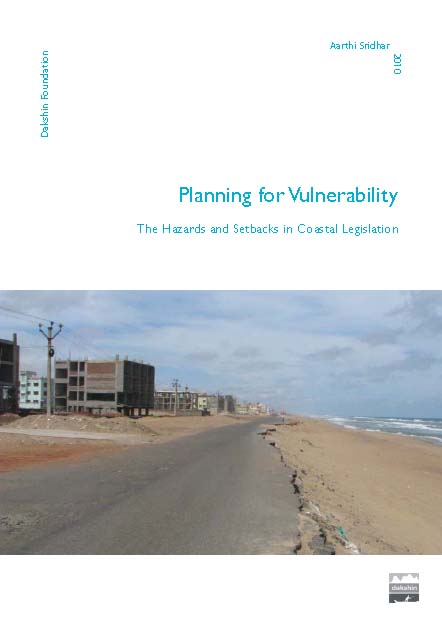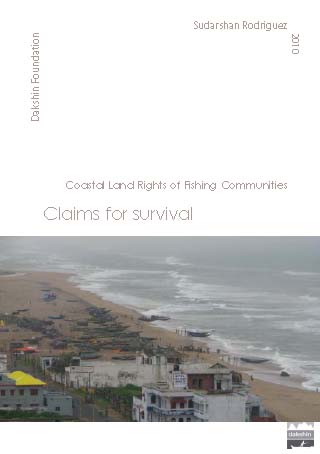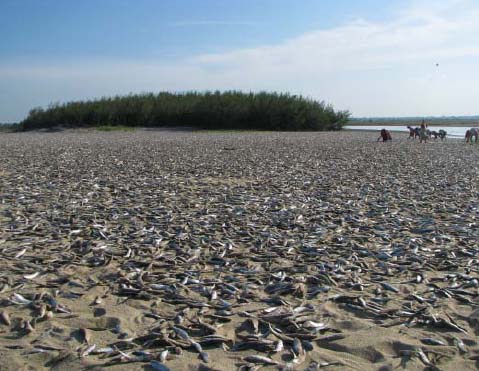/topics/citizens-rights-and-duties
Citizens' Rights and Duties
A citizen initiative to save Puttenahalli Lake in JP Nagar, Bangalore
Posted on 22 Jun, 2011 11:50 AMResidents of L&T South City and Brigade Millenium in JP Nagar, Bangalore formed a citizen initiative to save the neighbouring Puttenahalli Lake from becoming a dumping ground for construction debris and waste. A team from India Water Portal visited the lake in June 2011 to see the progress and challenges faced by such citizen initiatives.
"Battles over land" - Land as commodity and land for livelihoods - Special issue from Infochange
Posted on 18 Jun, 2011 12:48 AMWhat are the laws governing acquisition? What is the social impact of a development-at-all-costs policy? Can those who owned and lived off the land have a stake in its development?
Planning for vulnerability - The hazards and setbacks in coastal legislation – A report by Dakshin Foundation
Posted on 22 May, 2011 06:16 PM The law pertaining to coastal spaces – the Coastal Regulation Zone (CRZ) Notification, 1991 specifically decides what people can and cannot do on the coastal stretches of the country.
The law pertaining to coastal spaces – the Coastal Regulation Zone (CRZ) Notification, 1991 specifically decides what people can and cannot do on the coastal stretches of the country.
Inclusion of a component relating to rural drinking water in the special package for drought mitigation strategies in Bundelkhand region of Uttar Pradesh and Madhya Pradesh - PIB release
Posted on 22 May, 2011 05:09 PMThis would be in addition to the other measures approved by the Cabinet on 19th November, 2009 under the special package for implementing drought mitigation strategies in Bundelkhand.
Harbouring trouble - The social and environmental upshot of port growth in India – A report by Dakshin Foundation
Posted on 22 May, 2011 12:04 PMBesides its own impact, port development is often accompanied by other activities such as the location of industries, power plants, railway lines, highways, hotels, SEZs, residential complexes, etc., that have multiple detrimental impacts – environmental, social and erosion related.
Claims for survival - Coastal land rights of fishing communities – A report by Dakshin Foundation
Posted on 22 May, 2011 09:25 AM Marine-coastal ecosystems and coastal communities are poorly represented in the public debates on India’s social and environmental problems. Coastal and marine ecosystems are the backbone of a fisheries economy that supports livelihoods of millions directly and several more indirectly.
Marine-coastal ecosystems and coastal communities are poorly represented in the public debates on India’s social and environmental problems. Coastal and marine ecosystems are the backbone of a fisheries economy that supports livelihoods of millions directly and several more indirectly.
Community groups such as fishers and other coastal populations enjoyed customary or traditional rights to exploit resources and to fish in adjacent coastal areas. The current state of fisheries finds its genesis in the modernization programme introduced by the Government of India to ‘develop’ the sector with the focus for development through the maximisation of production. In the late 1970s, modern fishing methods threatened the livelihoods of these communities and coastal ecosystems. Mechanised craft and gear, principally trawlers with bottom trawling gear, severely impacted fishing stocks.
Fisherfolk in India have struggled for greater control over the seas and resource management, struggles which have been directed both inward as well as against the State. The conflict over the coastal space is mostly between fishing communities and other new users and interest groups. Access to coastal resources is now being thrown open to all, giving a new meaning to the idea of ‘coastal commons’. There are very clear linkages between the rights to the coast and the right to fish as without the former, the latter will be difficult to operationalise and eventually rendered meaningless.
The Coastal Regulation Zone (CRZ) Notification, 1991 has been the only legislation with some mention and reference to customary rights of fishing communities on land in the coastal zone. However, it did not contain provisions and details to ascertain or establish these rights. Despite this, fishing communities have seen the CRZ in its 1991 form as an instrument in their favour as it regulates all activities that can potentially impact the coast and community livelihoods. However, the twenty one odd amendments to the CRZ Notification were mostly in favour of development pressures and special interest lobbies.
some mention and reference to customary rights of fishing communities on land in the coastal zone. However, it did not contain provisions and details to ascertain or establish these rights. Despite this, fishing communities have seen the CRZ in its 1991 form as an instrument in their favour as it regulates all activities that can potentially impact the coast and community livelihoods. However, the twenty one odd amendments to the CRZ Notification were mostly in favour of development pressures and special interest lobbies.
This backdrop forms the driving force behind this report which seeks to argue a case for according coastal land rights to fishing communities.
Kelo dam, Raipur, Chattisgarh oustees agitation - Hunger strike called off after meeting with Chief Minister - Audio updates from CGNet Swara
Posted on 19 May, 2011 11:03 AMArticle courtesy: CGNet Swara
Kelo dam hunger strike: 7 more farmers shifted to hospital
Rajesh Tripathi is reporting from continuing hunger strike of farmers from Kelo dam site in Raigarh district of Chhattisgarh. He says 7 more farmers have now been shifted to hospital. 4 were shifted before in last 2 days.
An analysis of West Bengal Ground Water Resources (Management, Control and Regulation) Act 2005
Posted on 11 May, 2011 02:17 PMIntroduction
Open Space Fellowships 2011-2012: ‘Nurturing civil society leadership and action among young people’ - Pune
Posted on 10 May, 2011 10:56 AMOpen Space, the civil society and youth outreach programme of the Centre for Communication and Development Studies (CCDS), Pune, engages with citizens – especially young citizens - on contemporary social, economic and cultural issues through film screenings, performances, literary readings, music concerts, art, storytelling, capacity-building workshops, discussion and study forums, public lectures, youth festivals and campaigns. Open Space aims to be a vibrant place for youth to volunteer, learn, share ideas, and express themselves. Equally, Open Space supports CSOs and citizens to take their work/ideas/processes to a wide audience of concerned citizens, and also to build action networks.





